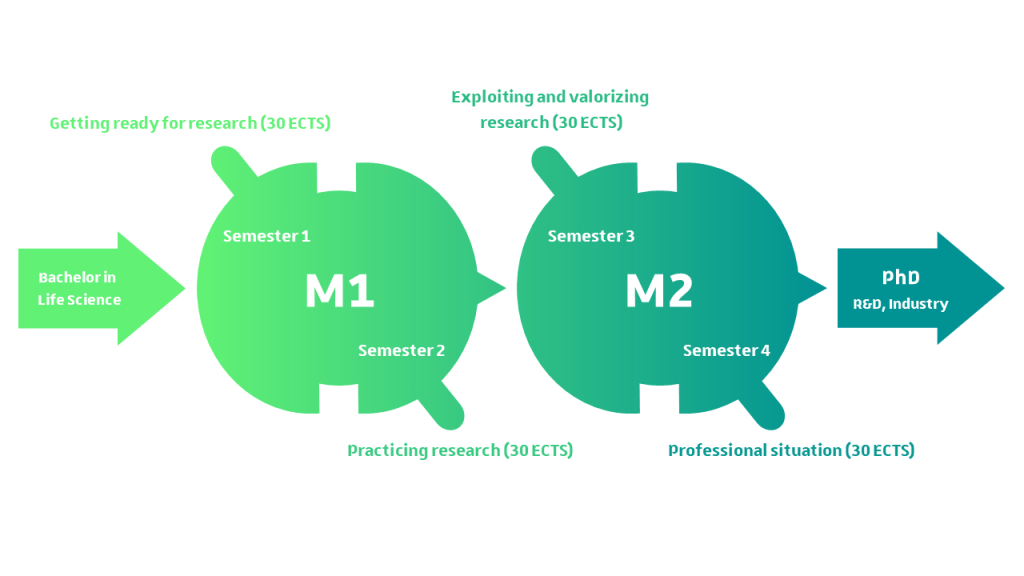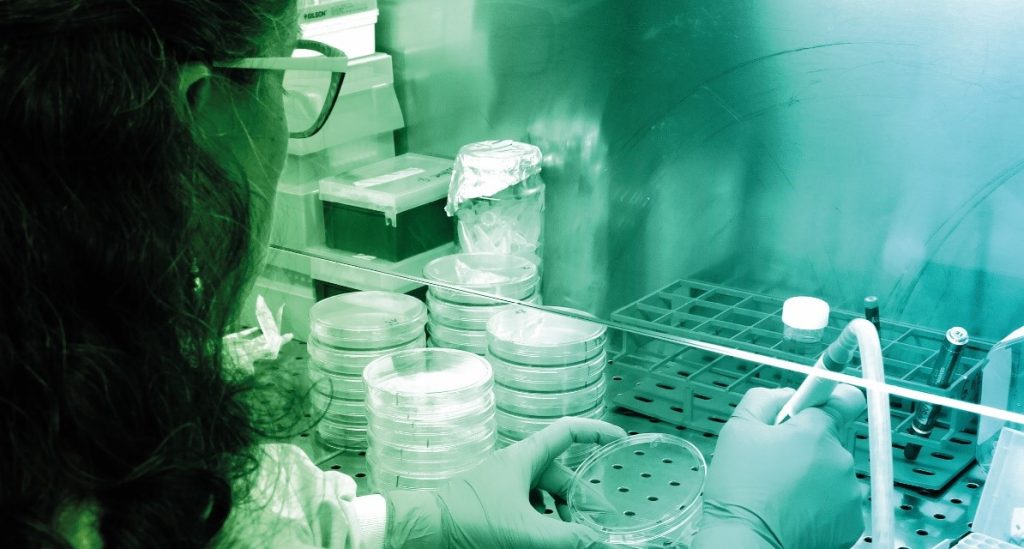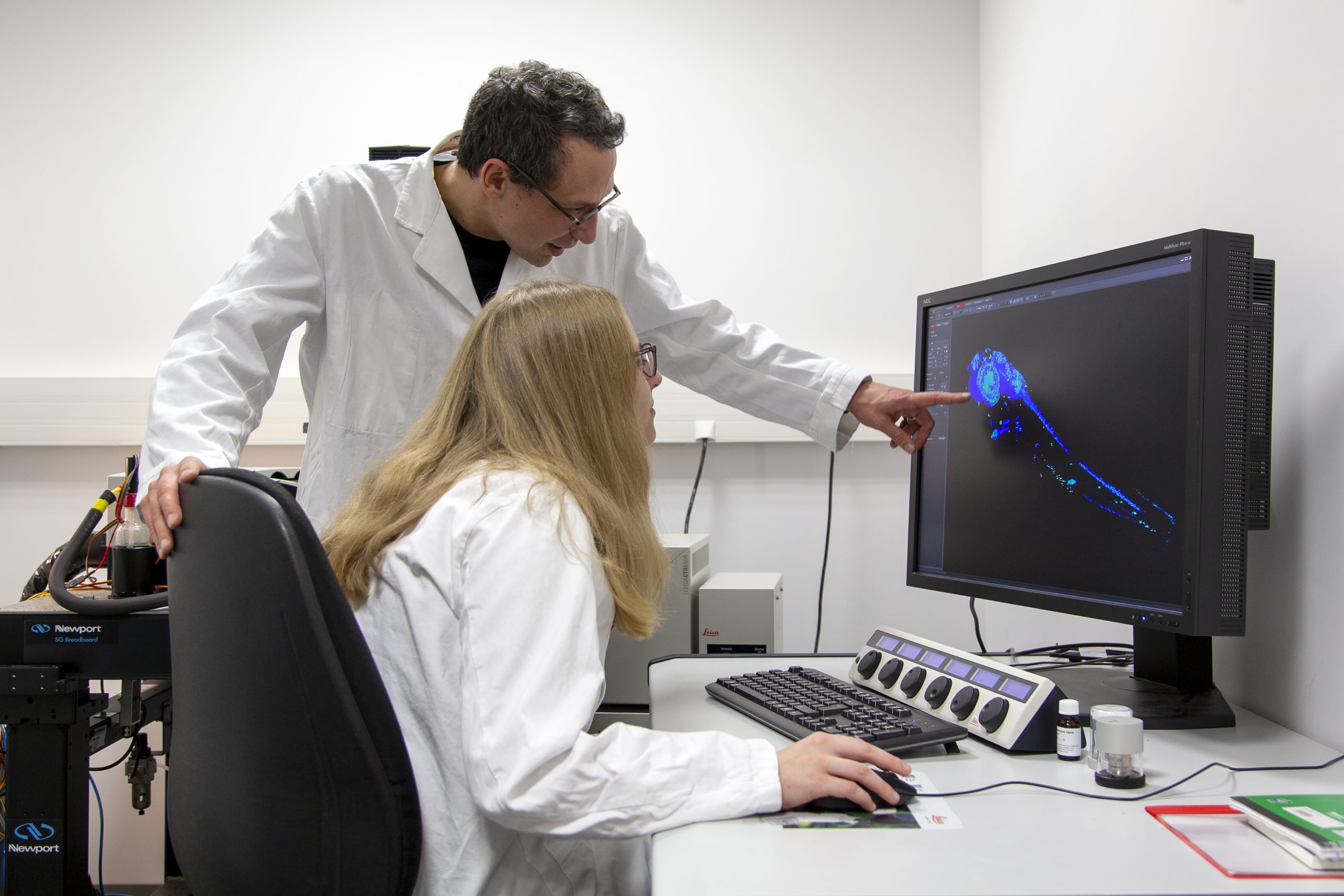Master level
The integrative Biological Sciences Master – iBioS
During the latest decades, research in molecular and cellular biology has undergone a rapid evolution. Integrative and large-scale studies are now routinely performed to decipher the complexity of biology and involves advanced skills and knowledge to be acquired in several fields. Based on a multidisciplinary campus at the leading edge of research in Life Sciences, the IMCBio graduate school provides a unique environment for a broad interdisciplinary training in Biology. Exploiting this unique richness, IMCBio proposes in association with the faculty of Life Sciences the brand-new international Master track of integrative Biological Sciences iBioS.
To provide to you, master student, a strong knowledge in modern biology, our unique iBioS Master Program proposes specific training units in English in synergy with some high-level training units proposed by the Life Sciences faculty from the University of Strasbourg.

By choosing this program you will get:
Those elements are essential now-a-days for a competitive career in biology research.
The major asset of the iBioS program relies on its dynamic evolution and adaptation to the needs of the students, so do not hesitate anymore !
Here’s some highlights of the program:
The “iBioS” international track in integrative Biological Sciences aims to train students in research through research, by placing them as early as possible in an immersive and professionalizing environment, in connection with the inherent societal, ethical and socio-economic issues. To foster this immersive experience and maximize the international appeal of the program, all courses will be taught in English.
A tailored teaching
Driven by a strong desire to place students at the heart of their training, and to enable them to tailor it as closely as possible to their interests, the course is structured around a common core and a block of optional courses. Depending on whether the student is more interested in biology at the molecular and structural level, or at the cellular and organismal level (single or multicellular), he or she will be able to choose an appropriate block of specializations.
A core teaching
The core teaching will provide students with all the tools, codes and know-how they need to develop their scientific mindset and acquire the associated approach. Deployed within the framework of the IMCBio Graduate School, this program benefits from the expertise of over 70 research teams involved at different levels, enabling the implementation of innovative courses covering the key elements needed for optimum integration into the world of scientific research:
– True backbone of the course, a tutored project consisting of several steps spread over the first 3 semesters of the program will enable students to (i) analyze and acquire the scientific literature inherent to a project they have chosen from a proposed catalog; (ii) design, budget and carry out practical experiments to advance the state of knowledge on the chosen theme; and finally (iii) valorize this work through editorial work, presentations in a professional environment and study its applicative potential.
– This student work will be complemented by two short internships and one long internship in a public research laboratory within the IMCBio perimeter (or abroad, or in a private company).
– Dedicated courses will train students in the best practices of data analysis using statistical and IT tools.
– Students will also learn about the rules of ethics and good conduct in science.
– Participation in, and even organization of, scientific meetings or meetings with business players will complete this training by stimulating PhD students communication and exchange skills.
At the end of this training program, students will have acquired the set of disciplinary (theoretical and practical), organizational and behavioral skills required for effective public or private research sector.

We can’t emphasize enough: it’s central to IMCBio to promote interdisciplinarity. Therefore, in the first Master year, we promote that your research internships take place in different campuses of the Strasbourg University: Esplande (Research Clusters MitoCross, NetRNA and HepSYS) or Illkirch (Research Cluster INRT). An internship in an industry setting or in another country is also possible.
Please note that by following the Master program, entrance to the IMCBio PhD program is not automatic but will be facilitated. Some doctoral contracts will be attributed to the best IBioS Master students and additional funding will be available through our PhD Call or University of Strasbourg/ED414.

PhD level
In the heart of Europe, the IMCBio graduate school PhD program is perfect for those passionate by life sciences and biomedical research. The complementarities and synergies between the different research groups of our graduate school constitute an attractive training community for you as a future IMCBio PhD student. It is the place for eager and motivated minds to develop their ideas.
The IMCBio PhD Program is a three year – intensive training program developed to train the next generation of scientists. During these three years, our IMCBio PhD students:
Here you can see two PhD students testify on their IMCBio experience in two short clips:
By choosing the IMCBio PhD program you will:
To benefit from this unique opportunity to get a broad overview of every aspects of gene expression and regulation covering from nuclear organization and epigenetics to post-transcriptional and post-translational events as well as crosstalks between the nucleus, the cytoplasm and organelles in eukaryotes in the context of cell-to-cell communication, development and diseases, then come and join us!
To apply to our PhD program please follow this link.
For information on the courses please follow this link.

